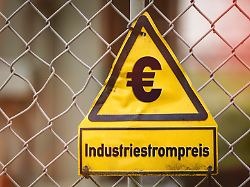Traffic lights rely on compensation
Compromise could end dispute over industrial electricity prices
September 15, 2023, 5:44 p.m
Listen to article
This audio version was artificially generated. More info | Send feedback
Companies and associations are waiting for clarity: the dispute over industrial electricity prices has so far lacked a solution. Now there should be a compromise within the traffic light coalition. It is said that there is a so-called electricity price compensation in the room.
In view of the high electricity prices in Germany compared to other countries, the federal government is looking for a compromise to relieve the burden on companies. A new proposal is now being prepared in the Chancellery and the Ministry of Economic Affairs, reports “Spiegel”. Accordingly, the so-called electricity price compensation could be expanded, which around 340 energy-intensive companies would receive – for example for steel, chlorine or paper produced.
Government spokesman Steffen Hebestreit said in Berlin, with a view to the debate, that suggestions that were made had something for and against them. Other avenues would be examined and investigated. There is still no final status.
When it comes to electricity price compensation, companies are relieved of costs through EU emissions trading. In the draft economic plan of the Climate and Transformation Fund – a special federal fund for investments primarily in climate protection – around 2.6 billion euros are planned for this purpose for the coming year.
The only realistic financing option
According to “Handelsblatt” information, the Chancellery and the Ministry of Economic Affairs are prepared to finance a subsidized electricity price from the Climate and Transformation Fund (KTF). Financing via the KTF could also change Finance Minister Christian Lindner’s mind. It was said that the KTF was the only realistic financing option for the industrial electricity price.
In the coalition made up of the SPD, the Greens and the FDP, a debate has been going on for months about easing the burden on companies in terms of electricity prices. Companies fear for their competitiveness. Associations warn of an increasing migration of production abroad.
Economics Minister Robert Habeck from the Greens, the Greens parliamentary group and the SPD parliamentary group want a state-subsidized industrial electricity price for a transitional phase – the FDP is against it, Chancellor Olaf Scholz rejects a “permanent subsidy of electricity prices with a watering can”, as he said. The FDP proposes a reduction in electricity tax. According to “Spiegel”, a concept for expanding electricity price compensation has now been developed by consulting companies and presented to officials by Scholz and Habeck.
The authors put the costs for the state at around ten billion euros by 2030. That would be significantly less than the “bridge electricity price” proposed by Habeck. FDP leader Lindner told the “Rheinische Post” that an industrial electricity price would not be affordable. “Secondly, it distorts competition between corporations and medium-sized businesses. Thirdly, it could reduce the incentive for industry to conclude long-term supply contracts without subsidies. They would speculate on a permanent subsidy. And that would have a negative impact on the expansion of solar power plants and wind power,” said the minister.
